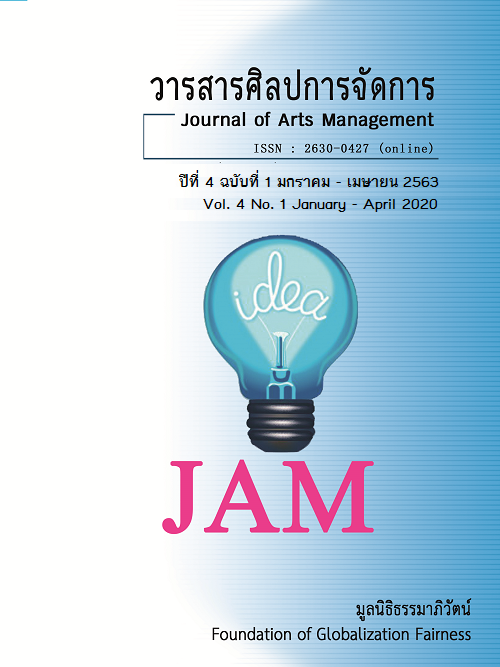มุมมองการศึกษาเชิงปรัชญา การยอมรับการเปลี่ยนแปลงเชิงพุทธสันติวิธี
Main Article Content
บทคัดย่อ
บทความวิจัยนี้ มีจุดมุ่งหมายเพื่อสะท้อนมิติการศึกษาที่มีการเปลี่ยนแปลงตั้งแต่อดีตจนถึงปัจจุบัน โดยผู้สอน มีมุมมองวิธีการถ่ายทอดที่ต่างกันตามยุคสมัยและแปรเปลี่ยนไปตามวิวัฒนาการของบทบาทหน้าที่ ซึ่งเป็นคุณสมบัติอย่างหนึ่งของผู้ที่ถูกเรียกว่า ครู หรือ ผู้สอน ซึ่งควรมีใจเป็นกลาง เปิดใจยอมรับการเปลี่ยนแปลงที่เกิดขึ้น ไม่ว่าจะเป็นเรื่องการพัฒนาตนเองด้านเทคโนโลยี การเปิดใจยอมรับสังคมที่เปลี่ยนไปอย่างรวดเร็ว การสื่อสารภาษาที่แปลกและแตกต่างของผู้เรียน รวมถึงการแสดงความคิดเห็นในแง่มุมต่าง ๆ ในบริบทคนไทย อาจมีเรื่องวัฒนธรรมเข้ามาเป็นกรอบ ทำให้ผู้เรียนไม่สามารถแสดงความคิดเห็นได้มากเท่าที่ควร ในทางตรงกันข้าม ผู้เรียนแถบตะวันตก กล้าที่จะแสดงความคิดเห็นได้มากกว่า ชี้ให้เห็นว่า การยอมรับ การเปิดใจด้านความคิด ในเรื่องการให้ความรู้ ทำให้การแสดงออกของผู้เรียนทั้งตะวันออกและตะวันตก มีความแตกต่างกันอย่างเห็นได้ชัด อย่างไรก็ตาม ผู้สอนมีส่วนสำคัญที่ทำให้ผู้เรียนกล้าพูดกล้าคิดและกล้าทำ ในเชิงปรัชญา การศึกษา คือ ความเจริญงอกงาม (สาโรจน์ บัวศรี, 2549) การพัฒนาคนให้เป็นคนโดยสมบูรณ์ด้วยวิธีการถ่ายทอดความรู้ให้กับผู้เรียนได้เข้าใจถึงแก่นของการศึกษา เป็นการสอนอย่างแท้จริง
ผลการศึกษาพบว่า ผู้สอน ผู้เรียน และหลักสูตร เป็นส่วนประกอบสำคัญของโครงสร้างทางการศึกษาบนพื้นฐานการเปลี่ยนแปลงของโลกยุคดิจิตอล ซึ่งจากนี้ การเรียนการสอนไม่จำเป็นต้องอยู่เฉพาะแต่ในห้องเรียน หรือในสถาบันอีกแล้ว ดังนั้น การปรับตัวทั้งผู้เรียนและผู้สอนจึงสำคัญที่สุด สำหรับโปรแกรมต่าง ๆ และ สื่อออนไลน์ ใช้เป็นเครื่องมือการเรียนการสอน ในมุมมองการศึกษาเชื่อมโยงกับพุทธสันติวิธี คือ การยอมรับการเปลี่ยนแปลงที่เข้ามาแทนที่อดีต ด้วยใจที่เป็นกลาง
Article Details
ทัศนะและความคิดเห็นที่ปรากฏในบทความในวารสารศิลปการจัดการ ถือเป็นความรับผิดชอบของผู้เขียนบทความนั้น และไม่ถือเป็นทัศนะและความรับผิดชอบของกองบรรณาธิการ ยินยอมว่าบทความเป็นลิขสิทธิ์ของวารสารศิลปการจัดการ
เอกสารอ้างอิง
ประเวศ วะสี. (2550). การเรียนรู้ใหม่ไปให้พ้นวิกฤติแห่งยุคสมัย. กรุงเทพฯ: โรงพิมพ์ร่วมด้วยช่วยกัน.
ปรียาพร วงศ์อนุตรโรจน์. (2546). จิตวิทยาการศึกษา. กรุงเทพฯ: พิมพ์ดี.
วิชัย วงศ์ใหญ่. (2539). กระบวนการทัศน์ใหม่ในนวัตกรรมหลักสูตร: ข่าวสารกองบริการการศึกษากรุงเทพฯ: ทบวงมหาวิทยาลัย.
วิทย์ วิศทเวทย์. (2555). ปรัชญาทรรศน์: ปรัชญาการศึกษา. กรุงเทพฯ: จุฬาลงกรณ์มหาวิทยาลัย.
สาโรช บัวศรี. (2549). การศึกษาและจริยธรรมศาสตราจารย์ ดร.สาโรช บัวศรี. กรุงเทพฯ: มหาวิทยาลัยศรีนครินทรวิโรฒ.
อภิญญา เฟื่องฟูสกุล. (2546). อัตลักษณ์. คณะกรรมการสภาวิจัยแห่งชาติ สาขาสังคมวิทยา. กรุงเทพฯ: สำนักงานคณะกรรมการวิจัยแห่งชาติ.
Good. C.V. (1973). Dictionary of Education. New York: McGraw – Hill Company.
McNeil, J. (1975). The Psychology of Being Human. San Francisco. California: Canfield Press.
Miller, R. (2000). Making Connections to the World: some Thoughts on Holistic Curriculum. Brandon, VT: Foundation for Educational Renewal.


